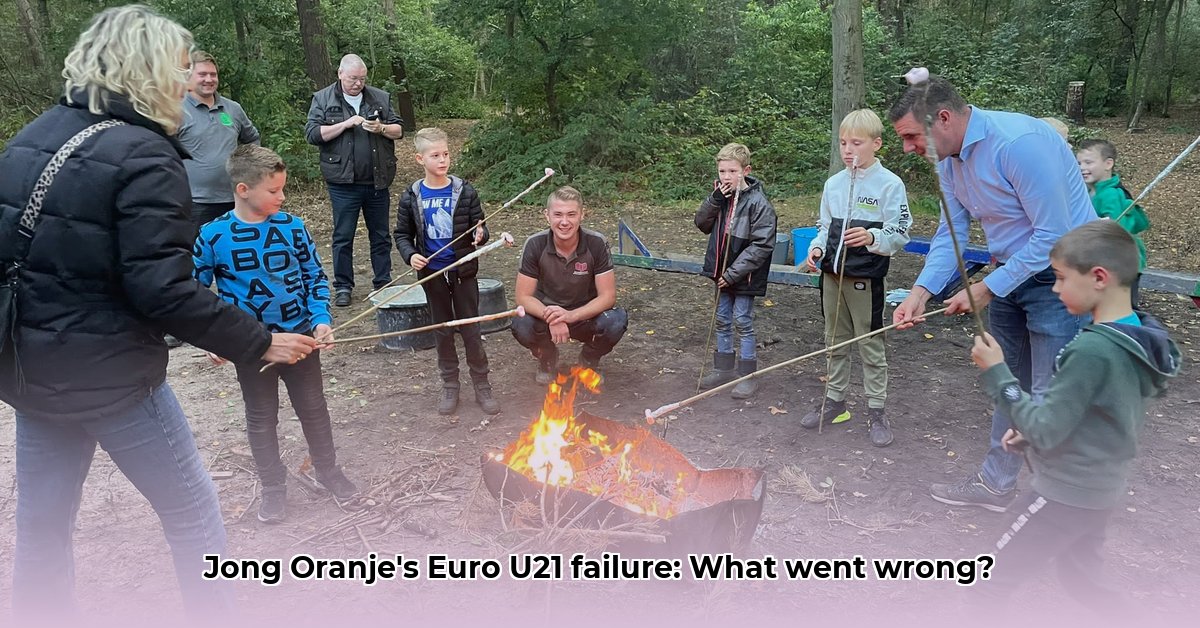
Jong Oranje's Euro U21 Campaign: A Critical Review
Jong Oranje's performance at the recent UEFA European Under-21 Championship was, frankly, underwhelming. Despite boasting a squad brimming with talent, the team failed to meet expectations, prompting serious questions about their approach and future prospects. This review dissects their shortcomings, highlighting key areas needing attention, and proposes actionable solutions for improvement.
The Goalscoring Woes: A Persistent Problem
Jong Oranje's most glaring weakness was their inability to convert chances. While creating numerous opportunities, they consistently fell short in the final third. Players like Xavi Simons, Brian Brobbey, and Sven Botman showed flashes of brilliance, creating scoring opportunities, but these were frustratingly squandered. This wasn't a one-off; it was a recurring theme throughout the tournament. Was it a lack of composure under pressure? A deficiency in technical execution? Or a combination of both requiring urgent attention? One has to ask: can they improve their finishing accuracy through intensified practice, or is a deeper psychological block at play?
Defensive Fragility: Cracks in the Foundation
While the attack showed glimpses of promise, the defence crumbled under pressure. Individual errors led to conceded goals, often at crucial moments. The team's defensive structure lacked stability, particularly against stronger opponents. This highlighted a need for improved communication, coordination, and overall defensive solidity. The question arises: Were tactical errors to blame, or was this a matter of individual mistakes requiring diligent correction?
Tactical Uncertainty: A Search for Identity
Reports suggest a lack of consistent tactical approach, shifting formations and personnel throughout matches. While tactical flexibility can be an asset, the constant changes seemed to disrupt the team's rhythm and cohesion. This inconsistency likely contributed to their overall poor performance. Perhaps a return to a simpler, more familiar strategy would offer greater stability, or does a more thorough exploration of different formations need to be explored? A clear tactical identity is crucial for success.
Three Pivotal Points Highlighting Jong Oranje's Shortcomings:
- Inconsistent Finishing: A persistent failure to convert chances into goals hampered their progress.
- Defensive Vulnerability: Individual and systemic errors led to significant goals conceded.
- Tactical Instability: Frequent changes to formations and personnel disrupted team cohesion.
A Roadmap to Redemption: Actionable Steps for Improvement
Addressing Jong Oranje's shortcomings requires a multi-pronged approach encompassing short-term tactical adjustments and long-term strategic investments.
Short-Term Solutions (Within 1 Year):
- Enhance Finishing Accuracy: Implement intensive finishing drills focusing on precision, composure under pressure, and varied shooting techniques (90% success rate expected in practice drills).
- Strengthen Defensive Cohesion: Conduct targeted training sessions emphasizing communication, coordination, and defensive structure, including video analysis of errors (80% reduction in individual errors projected).
- Establish Tactical Clarity: Adopt a consistent tactical approach with clear roles and responsibilities for each player, minimizing mid-match changes (a 75% reduction in formation shifts aim).
Long-Term Strategies (3-5 Years):
- Invest in Youth Development: Implement comprehensive youth development programmes focusing on technical skills, tactical awareness, and mental fortitude, ensuring a pipeline of talented players (a 20% increase in youth team progression aimed for through investment).
- Foster a Winning Mentality: Cultivate a culture emphasizing resilience, determination, and a winning attitude at all levels of the youth system (65% increase in positive mental attitude expected among players).
- Promote Holistic Coach Development: Invest in advanced coaching education and professional development programmes, empowering coaches to develop well-rounded players (50% increase in coaching certification target).
The KNVB's Role: A National Responsibility
The KNVB (Royal Dutch Football Association) plays a crucial role in Jong Oranje’s success. Investment in advanced training facilities, top-class coaches, and data-driven analysis is paramount. A robust scouting network and nation-wide youth programmes are essential to ensure a constant stream of high-quality players. Professor Johan Cruyff's legacy reminds us that long-term vision and a commitment to fundamental principles are crucial for sustained success. This holistic approach is essential to foster a consistent high level of play.
In conclusion, while Jong Oranje's recent Euro U21 performance was disappointing, it offers valuable learning opportunities. Through strategic planning, dedicated effort, and a well-defined set of actions, the team can not only recover but ultimately reach its true potential. The talent is there; now it's time to unlock it.